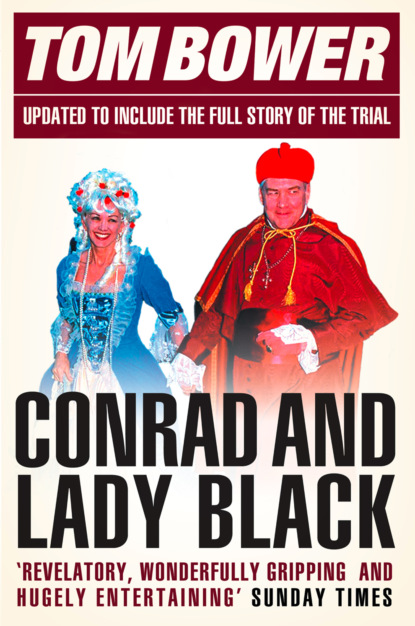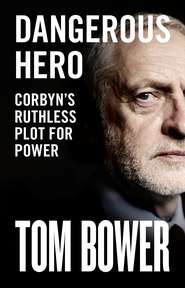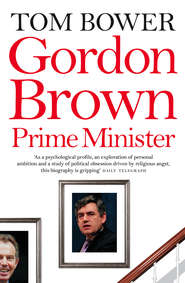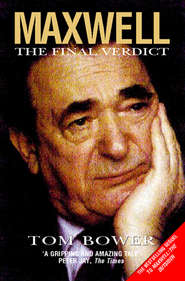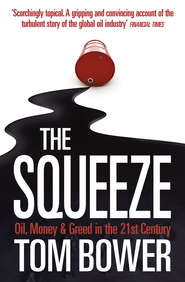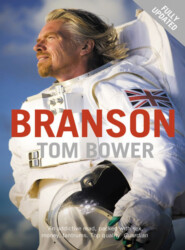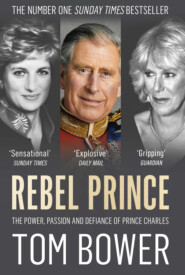По всем вопросам обращайтесь на: info@litportal.ru
(©) 2003-2024.
✖
Conrad and Lady Black: Dancing on the Edge
Настройки чтения
Размер шрифта
Высота строк
Поля
(#litres_trial_promo) With pleasure he pontificated, ‘I suspected I was starting ticking a public and press-relations time bomb.’
(#litres_trial_promo) To his glee, his clever asides were published uncritically. He would, he smiled, continue the traditional Argus dinners, inviting the country’s 150 most important men. No one, he guessed, would refuse the invitation of a man with unique style, so superbly erudite among bankers, politicians and intellectuals, able to articulate the advantages of capitalism over the creeping socialisation of their country.
Reflecting on his victory, Black suggested that he drew pertinent lessons from the criticism he had received then for the remainder of his career. ‘The lesson of June is to be wary of setting out in the most cynical way to use people you have underestimated. The pickpocket whose pocket is picked receives, and deserves, little sympathy … In finance, only proprietors can consistently act like proprietors.’
(#litres_trial_promo) That statement exposed a confusion in Black’s attitude towards business. He was suggesting that only a ‘proprietor’ – someone who owned 100 per cent of a company – could behave selfishly, regardless of others. ‘My natural sympathies are with the proprietors whose own money is at stake,’ he said, admiring the personal control of companies enjoyed by Galen Weston, Fred Eaton, Ken Thomson, Hal Jackman and the American moguls. With their substantial control of their businesses, they shone in Black’s eyes compared to mere professional managers. Black’s misfortune was that he was not a proprietor. He lacked the money to buy out Argus’s other shareholders. Yet, as a raw capitalist, he was emphatic that proprietors and investors were bound to live by the laws of the jungle. ‘There is not,’ he emphasised at this critical moment in his career, ‘and should not be, any safety net for the rich.’
Amid the excitement, on 14 July 1978 Conrad Black married Shirley Walters. Considering his aspirations, Black did not arrange the society wedding some had expected. His old friends understood the socially insecure groom’s desire to be certain of a loyal, unstrident wife who would provide him with a domestic refuge. After the small ceremony, witnessed by a handful of friends, twenty people gathered at Black’s house for dinner. At 10 p.m., exhausted by the takeover battle, he left his guests and bride and went to bed. On the wedding certificate he listed his profession as ‘historian’. That was a critical claim for what would follow.
(#litres_trial_promo)
2 The Stain (#ulink_08d0e5a1-2ab5-59a8-85ca-e73546dadcb0)
ON 15 JULY 1978, the day after his wedding, Conrad Black sat with David Radler and Peter White by his swimming pool to discuss the future. Becoming a billionaire was a possibility. With hard work and astute management, Argus could evolve into a global business. Serious hurdles, Black knew, needed to be overcome. After years of exploitation, Argus was short of cash and the companies had been bled dry. Transforming the lame ducks would be exhausting. Living off dividends and expenses in Bud McDougald’s fashion was no longer possible. Black was faced with a choice: either hard work and the possibility of creating enormous wealth, or limited work and a good life. Sitting in the sunshine in the midst of his seven-acre garden, Black did not welcome the prospect of devoting mind-numbing attention to the intricate details of production, finance and markets. His ambition was to become a man of influence, enjoying the luxury of a cash machine. Getting money, not least to repay his debts, was a priority. His candid confession about ‘not gambling more than my original $500 in 1966 on the Argus project’ was largely accurate.
(#litres_trial_promo) Other than his inheritance, his wealth depended upon drawing cash from the companies he controlled.
Black’s entry into the huge chairman’s office at Massey-Ferguson headquarters in Toronto was a symbolic moment. Over 131 years the corporation had symbolised Canada’s virility, although the image had become flawed. With over C$1 billion of debt, the company was on the verge of self-destruction. Poor products, strikes and a recession among American farmers jeopardised its prospects. Conrad Black had placed himself in the spotlight with the aim of saving the jobs of 48,000 employees. Although Argus owned just 16 per cent of the company, Black was empowered by the shareholders to act as the sole owner.
(#litres_trial_promo) Within hours of his welcome, delegations of bankers, politicians, trade union representatives and journalists arrived to hear about his intentions. He compared his plans with the tactics of his military heroes. Alternately he summoned the image of Napoleon transforming a rabble into a victorious army in Italy in 1795, or he cited the British tactician Captain Basil Liddell Hart, the inventor of tank warfare after 1917. The military analogies suited his temperament. Succumbing to the vision of himself as the genius executing a brilliant victory, he spoke to the media about rescuing Canada’s jewels. All his visitors departed reporting the chairman’s optimism and his pledge to rescue Massey-Ferguson from the brink of collapse, if necessary by investing his own fortune.
(#litres_trial_promo) They agreed that having fought hard to take over Argus, Black was accountable for saving Massey, possibly with government help.
Simultaneously, Monte Black became responsible for Dominion Stores Ltd, which employed 25,000 employees in 376 supermarkets. Dominion was a substantial business with annual sales of C$2.4 billion, but bad management had reduced its annual profits to just $24 million. Monte Black was not the natural choice to revive a decrepit supermarket chain’s fortunes. Decent and genial, he preferred not to have to rise early in order to undertake the grinding routine of visiting each shop to improve its profit margins, ensure regular supplies of fresh food and supervise its refurbishment. Rather, he enjoyed playing around in planes and big cars, and hosting uproarious parties. ‘Monte’s idea of management,’ said a fellow director, ‘was saying, “Let’s have a good lunch,” stepping into his chauffeured car and afterwards enjoying a long snort of whiskey in the Toronto Club.’ Since Conrad rarely got out of bed before noon and was congenitally unpunctual, there was little pressure on Monte to change his own habits. Within weeks he was floundering. The pressure fell on Conrad, and he spontaneously announced his discovery of a cancer in Dominion. The company, he declared, was plagued by employees who were ‘notorious crooks’, stealing about $30 million every year and thus destroying the business. But instead of quietly recruiting good staff and improving controls, Black publicly denigrated the company’s executives.
(#litres_trial_promo) He pinpointed chief executive John Toma, describing him, without supporting evidence, as the architect of ‘murky relationships’ with suppliers and accusing him of overseeing staff whom he damned as ‘trained reptiles’ whose ‘financial ethics’ were similar to ‘the profligate corruption of looters’.
(#litres_trial_promo) Few understood how humiliating the staff could save Dominion Stores, but Black regarded ‘shock’ and the consequent ‘conspiracy of embarrassed liberal silence’ as an effective management tool.
When that failed he fired Toma, who disputed the allegation, and appointed David Radler as the chief executive. Among the bewildered observers was Galen Weston, the head of a rival retail chain. Neither Weston nor others, however, noted Black’s unannounced agenda. Unnoticed, Ravelston began levying management fees on Dominion which would total $40 million over the next seven years, denuding the company of cash. Commercially, Black’s strategy was folly, but any criticism would be a misunderstanding of Black’s purpose. He was unwilling to undertake the necessary work – he wanted cash – and in his conversations with the Almighty, his Maker agreed that as the victim of ungrateful and dishonest employees, he was entitled to reward himself with substantial fees.
By January 1980 Black was also struggling to save Massey-Ferguson from bankruptcy. He resisted undertaking fact-finding tours of the company’s plants across America and Europe to discover the cure for its inability to match its competitors. Out of his depth, he remained in Toronto, dismissing the cynics and reassuring those concerned about the future of the remaining 30,000 employees, despite the growing recession. By early May, as the company’s plight deteriorated further, Black publicly insisted that he could save it if he received help from the government and his bankers. In fact, however, he was calculating the tax advantages of abandoning Massey-Ferguson.
Black’s friend Hal Jackman, the manager of a major fund and a substantial investor in Ravelston, had become alarmed. Black’s intentions and promises to invest in Massey-Ferguson were puzzling, not least because Jackman knew Black had no real money. He was a man, Jackman realised, prone to overestimating his worth. During a ‘boozy night’s drinking’, Jackman was candid. ‘Your hubris and ego,’ he said, ‘are getting in the way of running this business.’ Black nodded. ‘Conrad,’ continued Jackman, ‘there’s nothing in this for me. I want out. Buy my Ravelston shares.’ ‘Right,’ replied Black.
In September 1980 Black executed a dramatic stunt to avoid a costly disaster. After blaming the government for refusing to offer adequate help, he simply gave Argus’s shares in Massey-Ferguson to the employees’ pension companies and announced that he was walking away. Such acts would be characteristic of a career notable for dramatic entries and exits. Just before leaving the chairman’s office, Black removed from the wall a painting showing a gun carriage moving through a battle-scarred street in Arras, France, past a Massey dealer in 1918. Conrad Black appreciated trophies.
Canada was shocked by Black’s conduct. He was no longer a whizz kid but another Bay Street cowboy abandoning his responsibilities to thousands of families and the nation. In the media, Parliament and even among members of the Toronto Club, he was criticised as a profiteer without a social conscience, exploiting legal loopholes and manipulating companies’ assets for his personal profit. ‘I gave them no comfort at all,’ was all Black would say in his contradictory accounts of his negotiations with the government about the future of Massey-Ferguson.
(#litres_trial_promo) Arousing suspicions did not trouble Black, but he was intolerant of the consequences. In the Toronto Sun, Peter Worthington, the editor, accused ‘Conrad Tricky’ for incurring Massey-Ferguson’s horrendous debts. The criticism stung Black. His vilifiers deserved punishment for not recognising his glory. The Toronto Sun received a writ for defamation – the first of dozens which he would issue over the next twenty-five years – and a carefully crafted letter written in his unique style: ‘For the record (not that the Sun is a newspaper of record to anyone who does not suffer from severe lip-strain after half a minute of silent reading), the Sun’s theory that we should mortgage all the assets … to bail Massey out of a mess that none of us had any hand in creating, is too asinine to merit further reply’.
Reading his published letter in the Toronto Sun and contemplating the legal battle pleased Black. He had uttered, he imagined, the last word on the subject, and his critics were forever silenced. He could not imagine that his would-be peers – the Bronfmans, Westons and Thomsons – were embarrassed by his retreat at the expense of his employees and his refusal to rebuild the business. Observers noted that Victor Rice, Black’s successor at Massey, was fighting to save the company: he would succeed in increasing the share price from $1 in 1980 to $78 in 1999. They carefully considered Rice’s judgement of Black – ‘His perception of what he was doing and reality were two different things’ – and concluded that Black was ‘a flash-in-the-pan’.
(#litres_trial_promo) Conrad Black resented any disparagement. Others, he believed, were always to blame for his misfortunes. Spoilt as a child, he protected himself by accusing his critics of jealousy. ‘All those pent-up forces of envy and disbelief,’ he sneered, ‘finally showed their true colours.’
(#litres_trial_promo) To bolster his sense of his own infallibility and innocence he damned his critics for resenting his ‘unbroken string of successes’. Verbal flourishes, he believed, would cover his escape. ‘The only charge that anyone can level against us,’ he would say, ‘is one of insufficient generosity to ourselves.’
(#litres_trial_promo) Attracting envy to himself, he reasoned, confirmed his success.
Conrad Black was thirty-six-years old. His morality was as rigidly fixed as his ambition. He wanted wealth and influence. Preoccupied with manipulating his debts, his developing plan appeared to critics to transfer Argus’s real wealth from the public shareholders into Ravelston, the private company which he controlled. In his self-proclaimed ‘campaign of manoeuvre’ he initiated a bewildering succession of loans, dividends and special payments, shifting the ownership of companies and debts between Argus and Ravelston. In the process, Ravelston got richer while the price of Argus shares fell.
(#litres_trial_promo) ‘This policy,’ he would boast, ‘led over that time to what was probably the greatest compression of corporate dealing in Canadian history.’
(#litres_trial_promo) Outsiders, confused and suspicious, sold their Argus shares. As the price of the shares fell, Black used the cash which Argus earned from selling its assets to finance his own purchase of the company’s shares, so increasing his personal stake in the company.
(#litres_trial_promo) Pushing up prices and selling at the peak, the Bay Street cowboys were infamous for ‘pumping and dumping’ shares. Black did the opposite. As one of his managers quipped, ‘Conrad went to the dentist and ordered him to drill. When the dentist said that he could see no cavities, Conrad told him, “Drill anyway. I feel lucky today …”.’
(#litres_trial_promo) Peter Newman, Black’s first biographer, credited him with ‘taking rabbits out of apparently empty hats’.
(#litres_trial_promo) Others saw a magician waving an empty hat, treating employees as ‘toy soldiers’ and, for his own self-enrichment, ignoring the interests of minority shareholders. ‘We originally created wealth out of thin air,’ he boasted, ‘but in a way that was perfectly licit.’
(#litres_trial_promo) Legality had assumed special meaning for Black. The repercussions were immediate.
The public debate about his conduct fed Black’s ambition to buy more newspapers and to become a broker of influence. His targets were publications whose owners, he asserted, were alcoholics and incompetents who had either succumbed to damaging strikes or had failed to fund the necessary investment in new plants and buildings. Included in his wish-list for purchase were Toronto’s Globe and Mail, the Ottawa Journal, and the Montreal Star. Repeatedly, the vendors rejected his offers and preferred to deal with Roy Thomson.
(#litres_trial_promo) Frustrated and needing money, Black lurched in the opposite direction and agreed to sell Sterling Newspapers for $14 million. But after scrutinising the figures, the prospective purchaser withdrew, pronouncing his dissatisfaction with the accounts.
(#litres_trial_promo) Black’s consolation was a conference organised by the Economist Intelligence Unit in Toronto. ‘Massey-Ferguson’s former chairman has agreed to sponsor the conference,’ Andrew Knight, the Economist’s editor, told Peter Jay, the recently-retired British ambassador to Washington. ‘Can you arrange for Henry Kissinger to make a keynote speech?’ Jay succeeded, and was talking to Kissinger in the conference hall’s ante-room before his appearance. Black seized his chance. As Jay began to escort Kissinger onto the platform, he was powerfully pushed from behind. Reeling to the side, he noticed Conrad Black striding up to Kissinger. ‘This way,’ smiled Black, engineering his introduction to a relationship which would bless his career. Before he returned to Washington, Kissinger had been seduced by Black’s profound knowledge and charm. Making use of this new relationship depended upon Black increasing his wealth.
With the option of buying more newspapers closed to him, Black identified mining as a certain profit-maker, and resolved to expand Argus’s investments in that field. Argus owned Labrador, an iron-ore extractor. For tax reasons, Labrador could benefit by involvement in oil exploration. After careful research, Black targeted Norcen Energy Resources, an undervalued oil and gas explorer. In December 1979 he had bought 10 per cent of the company’s shares from an investment group. The following day he telephoned Ed Bovey, the company’s chairman, to discuss his investment. Black would insist that, with Bovey’s agreement, he raised his stake to 40 per cent by February 1980.
(#litres_trial_promo) The investment was financed by bank loans, but essentially, in a complicated, tax-efficient procedure, Black used Norcen’s own money to finance his purchase. Next, using Norcen as his vehicle, he searched for another mining company in the United States. His motives were partly financial, but they were also social. Ever since he had visited London in 1953 and Palm Beach in the 1960s, and had left Montreal in disgust with Quebec’s separatist politics, Black had been dissatisfied with Canada. The country, in his opinion, was a narrow-minded backwater, and its politics were boring. America, by contrast, was exciting. For a social adventurer, Palm Beach was a natural stage on which to launch his presence in America.
In 1980 Conrad Black took his first step towards joining America’s rich set. He bought an unimposing colonial house at 150 Canterbury Lane, on the north end of Palm Beach island. The comfortable 8,700-square-foot house did not enjoy a sea view, but it was located near the resort’s nobility. Shirley Black employed an interior designer to decorate the house in Colefax & Fowler style, and although there were grumbles among local tradesmen about Black’s ‘ungentlemanly’ quibbles over their bills – like any shrewd businessman, he carefully examined the accounts – the social rewards were gratifying. Assiduously, Black cultivated Jayne Wrightsman, a former manicurist who had married an oil billionaire. After her husband’s death Wrightsman had used her inheritance to become Palm Beach’s patrician hostess. Invited for cocktails and dinner parties, Black worked hard to establish himself as a guest guaranteed to amuse others by reciting from his encyclopaedic memory of history and politics. ‘Come for dinner in Palm Beach,’ Wrightsman said to the London merchant banker Rupert Hambro. ‘I’ve met this hugely intelligent man who is so wonderful. He’s called Conrad Black.’ Hambro knew Black from summer weekends staying at the businessman Bob Dale-Harris’s farm north-east of Toronto. Meeting him again in Florida, he noticed how Black had changed. Touched by the glamour of big money, Black was flattered that Wrightsman, a kind, generous person, was attracted to him, and that by turn he had become a subject of conversation.
The proof of Black’s social acceptance was his proposal for membership of the Everglades Club, the meeting place of Palm Beach’s elite. The obstacles were Maude McDougald and Doris Phillips, the two Argus widows. Both still resented their humiliation, and campaigned to blackball their tormentor. Their tactics were in vain. Imperceptibly, Black organised his nomination and election without any formal notification. ‘Clubs are not democratic,’ the widows were told.
Shirley Black was uninterested in the Everglades Club and her husband’s social ambitions. Politics and business provoked indifference in the modest woman who appeared to some in Palm Beach as shy and ‘childlike’, relying on her husband to book babysitters and make other domestic arrangements. While he excelled at the formal dinners, lecturing on the refinements of French furniture or the career of an obscure general, she sat awkwardly, unappreciative even of his sense of humour, which occasionally, with the help of a few glasses of wine, reduced him to tears while he hilariously mimicked characters and accents. Regardless of Shirley’s disenchantment, with Wrightsman’s patronage Black was introduced into the society he yearned to emulate.
Cultivating the right image, Black knew, was essential to acceptance. Walking into a room, he took care that his large, physical presence captured the space around himself. Gracious but also aloof, his self-assured manner left onlookers in no doubt of his attitude: ‘I’m Conrad Black, take it or leave it.’ His quiet voice and gentle movements suggested that he was neither bombastic nor nasty. With studied stateliness suggesting coiled energy, he intimidated some, but never succumbed to an intemperate outburst. Speaking quietly, his big, intelligent, slightly oriental grey eyes fixed in an immobile face, he aroused curiosity whether his fluent, verbose language was expressing anger or pleasure, never using a short word if a longer one was appropriate. His new friends were impressed by his seamless prose and his prodigious memory.
Black’s next step was to accumulate the level of wealth so abundantly evident on the island. During his first holiday in Palm Beach he attended a rousing election speech by the Republican presidential candidate Ronald Reagan, whom he supported against President Jimmy Carter, a politician he loathed. Black’s enduring memory, besides Reagan’s appearance, was of the limousines parked outside the Breakers Hotel. As far as the eye could see were the biggest Mercedes and the most expensive Rolls-Royces, some lengthened, Black noted, ‘in proof of their owners’ ingenuity at devising methods of spending an additional $100,000 on a $200,000 automobile’.
(#litres_trial_promo) He himself had begun indulging his appetite to join the high-spending class. As well as his small yacht he had already accumulated several cars, including a Cadillac, a Mercedes and McDougald’s Rolls-Royce in London. On some of the bonnets he mounted a gold-plated eagle killing a snake. The symbol matched his goal.
Houses reflect their owners’ characters, and Black’s plans for the demolition and reconstruction of his parents’ home in Toronto confirmed his taste for grandeur. The Bridle Path had become the city’s ‘Millionaires’ Row’. Black’s architect produced plans to match his client’s aspirations. The mansion’s new entrance hall would be two storeys high, and a distinctive, high-domed rotunda modelled on the roof of St Peter’s Cathedral in the Vatican was to be erected over a library that would house at least 20,000 books. The story was spread that Black intended to repose on an eighteenth-century cardinal’s chair while reading about Napoleon in the midst of a palace that could host Toronto’s biggest parties. Others suggested that the chair was the one Napoleon sat on when signing treaties. Black’s illustriousness was confirmed when he persuaded Archbishop Carter of Toronto and Bishop Aloysius Ambrozic, both future cardinals, to formally bless the new library. Black was not a Catholic, and since he was not noticeably religious, outsiders believed that the prelates were invited as props in his developing plan to present himself as a serious player. Those cynics did not appreciate his dependence on conversations with God to justify the realisation of his entitlement. The priests’ presence validated his relationship with his Creator.
Black’s growing self-confidence of his ranking among the elect was enhanced in 1981 when he accepted an invitation to attend the Bilderberg Conference, an annual gathering of over a hundred of the world’s rich, famous and influential personalities. Dubbed by critics as the ‘Burnt-Outs club’, the conference was created in the mid-1950s by Prince Bernhard of the Netherlands to improve relations among members of NATO. As a representative of Canada, Black flew to Holland, where he began a series of special intellectual and personal relationships. Among those with whom he eventually bonded were Gianni Agnelli of Fiat, the newly appointed US Assistant Defense Secretary Richard Perle, the conservative American columnist George Will and Andrew Knight, the British editor of the Economist. He also renewed his acquaintance with Henry Kissinger. The participants at the conference were impressed by the studiously casual Canadian businessman, sauntering into meetings to regale his audience with his remarkable memory. ‘I’m a fatalist,’ he explained in one conversation. ‘I believe that people’s destinies are always more fascinating than their day-to-day reactions.’ His heroes, he continued, were common men whose dreams of greatness materialised after they had overcome huge adversity – Napoleon, de Gaulle, Abraham Lincoln, Marshal Foch, Lyndon Johnson and Franklin Delano Roosevelt. Whatever their personal faults, they were vindicated by their success. Historic acclaim, he argued, excused treachery. Eventual vindication after widespread hatred was the qualification for his worship. He preferred to forget that the rest of mankind lived by other rules – namely contemporaneous judgement.
Mixing with multi-millionaires and power-brokers fed Black’s fantasies. Bilderberg was a magnet for romantics, social climbers and conservatives, and like his new associates Black was aghast that America had surrendered in Vietnam rather than staying on to secure total victory. Their common Saviour was Ronald Reagan, the restorer of conviction to political life. As Black spoke, endlessly reciting juicy historic details, he visualised the prospect of becoming celebrated himself, providing quotations for later generations to savour. That surely was his destiny.
The following year Black invited Kissinger to address a group of Canada’s elite in Toronto. The former US Secretary of State, attracted to expensive meal tickets, was easily flattered by Black’s material generosity and scholarly praise. That Christmas Fred Eaton would give a copy of Kissinger’s memoirs to Black, and thereafter he would often hear from his friend, ‘I’ve just had lunch/dinner with Henry, and he says …’ Having gained an entrée to both the Bilderberg cast and Palm Beach’s aristocrats, Black sensed his opportunity to join the American establishment. Stepping up would require his own fortune.
Expanding into American mining seemed the perfect way to realise his financial and social ambitions. In January 1979 he had identified Hanna Mining, the world’s second-largest iron-ore producer, based in Cleveland, Ohio, as an ideal target. After secret discussions with Fred Eaton and Edward Battle, another director of Norcen, they agreed to accumulate enough shares covertly to buy Hanna at a bargain price.
Hanna was owned and managed by the Humphreys, a long-established family which was embroiled in numerous feuds. Argus and Hanna both owned an interest in the Iron Ore Company of Canada, which was run by Hanna with a 26.5 per cent stake, compared to Argus’s 10.5 per cent. That connection provided Black with the opportunity in June 1980 to initiate a conversation with George Humphrey, Hanna’s vice president. Humphrey, Black knew, was disgruntled by the Hanna board’s refusal to appoint him as chief executive. Instead, the family had selected Bob Anderson, a professional mining expert. Humphrey’s mother, a widow, shared her son’s anger. As a master of exploiting dissatisfaction, Black called on George Humphrey, offering his condolences and help. Seducing dissatisfied shareholders, Black knew from the capture of Argus, was an ideal tactic in take-over battles. With that chore completed, Black made use of repeated opportunities to meet other vulnerable members of the Humphrey family across America – in country clubs, boardrooms, restaurants and at a society ball. In August 1981, believing that his credentials were established, he sought the family’s approval to buy shares in Hanna. He would claim that both George Humphrey and Bob Anderson had offered no objections to his purchase of ‘some shares’,
(#litres_trial_promo) but the family and the company’s directors would insist that his proposal was firmly rejected.





